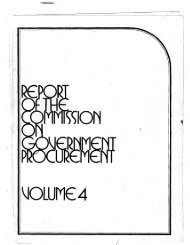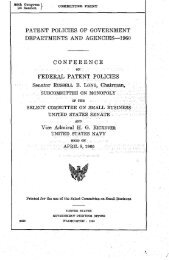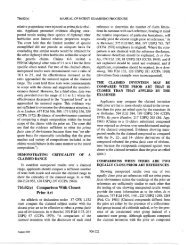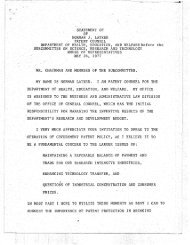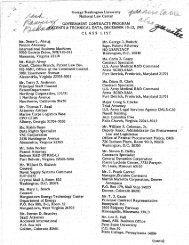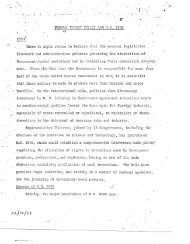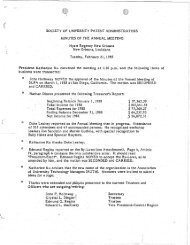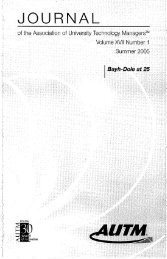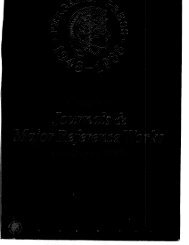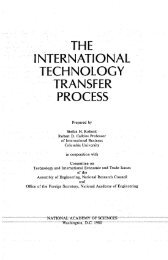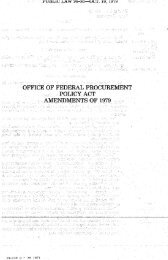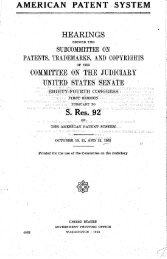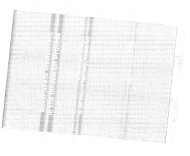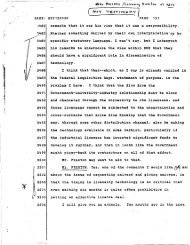The Subject Patent Already Has Underlining or ... - Bayhdolecentral
The Subject Patent Already Has Underlining or ... - Bayhdolecentral
The Subject Patent Already Has Underlining or ... - Bayhdolecentral
You also want an ePaper? Increase the reach of your titles
YUMPU automatically turns print PDFs into web optimized ePapers that Google loves.
1701.01 MANUALOF PATENT EXAMINING PROCEDURE<br />
<strong>Patent</strong> examiners and other USPfO employees perf<strong>or</strong>ming<br />
<strong>or</strong> assisting in the perf<strong>or</strong>mance of quasi-judi"<br />
cial functions, are f<strong>or</strong>bidden to testify as experts <strong>or</strong> to<br />
express opinions as to the validity of any patent.<br />
Any individual desiring the testimony of an<br />
employee of the USPfO, including the testimony of a<br />
patent examiner <strong>or</strong> other quasi-judicial employee,<br />
must comply with the provisions of 15 CPR Part 15,<br />
Subpart B.<br />
A request f<strong>or</strong> testimony of an employee of the<br />
USPfO should be made to the Office of the USPfO<br />
General Counsel at least 10 w<strong>or</strong>king days pri<strong>or</strong> to the<br />
date of the expected testimony.<br />
If an employee is auth<strong>or</strong>ized to testify, the<br />
employee will be limited to testifying about facts<br />
within the employee's personal knowledge. Employees<br />
are prohibited from giving expert <strong>or</strong> opinion testimony.<br />
Fischer & P<strong>or</strong>ter Co; v. C<strong>or</strong>ning Glass W<strong>or</strong>ks,<br />
61 F.R.D. 321, 181 USPQ 329 (B.D. Pa. 1974). Likewise,<br />
employees are prohibited from answering hypothetical<br />
<strong>or</strong> speculative questions. In re Mayewsky,<br />
162 USPQ 86, 89 (E.D. Va. 1969) (deposition of an<br />
examiner mnst be restricted to relevant matters of fact<br />
and must avoid any hypothetical <strong>or</strong> speculative questions<br />
<strong>or</strong> conclusions based thereon); ShajjerTool<br />
W<strong>or</strong>ks v. Joy Mfg. Co., 167 USPQ 170 (S.D. Tex.<br />
1970) (deposition of examiner should be limited to<br />
matters of fact and must not go into hypothetical <strong>or</strong><br />
speculative areas <strong>or</strong> the bases, reasons, mental processes,<br />
analyses, <strong>or</strong> conclusions .of the examiner in<br />
acting upon a patent application). Employees will not<br />
be permittedto give testimony with respect to subject<br />
matter which is privileged. Several court decisions<br />
limit testimony with respect to quasi-judicial functionsperf<strong>or</strong>med<br />
by employees. Those decisions<br />
include United States v. M<strong>or</strong>gan, 313 U.S. 409, 422<br />
(1941) (improper to inquire into mental processes of<br />
quasi-judicial officer <strong>or</strong> to examine the manner and<br />
extent to which the officer considered an administrative<br />
rec<strong>or</strong>d); Western Electric Co. v. Piezo Technology,<br />
Inc., 860 F.2d 428, 8 USPQ2d 1853 (Fed. Cir.1988)<br />
(patent examiner may not be compelled to answer<br />
questions which probe the examiner's technical<br />
knowledge of the subject matter of a patent); McCul"<br />
loch Gas Processing Co. v. Department of Energy,<br />
650 F.2d 1216, 1229 (Temp. Emer. Ct. App. 1981)<br />
(discovery of degree of expertise of individuals perf<strong>or</strong>ming<br />
govermnental functions not permitted); In re<br />
August 2001<br />
1700-2<br />
Nilssen, 851 F.2d 1401, 7 USPQ2d 1500 (Fed. Cir.<br />
1988) (technical <strong>or</strong> scientific qualifications of examiners-in-chief<br />
are not legally relevant in appeal under<br />
35 U.S.c. 134 since board members need not be<br />
skilled in the art to render obviousness decision);<br />
Lange v. Commissioner, 352 F. Supp. 166, 176 USPQ<br />
162 (D.D.C. 1972) (technical qualifications of examiners-in-chief<br />
not relevant in 35 U.S.c. 145 action).<br />
In view of the discussion above, if an employee is<br />
auth<strong>or</strong>ized to testify in connection with the<br />
employee's involvement <strong>or</strong> assistance in a quasi-judicial<br />
proceeding which took place bef<strong>or</strong>ethe USPfO,<br />
the employee will not be permitted to give testimony<br />
in response to questions which seek:<br />
(A) Inf<strong>or</strong>mation about that employee's:<br />
(I) Background;<br />
(2) Expertise;<br />
(3) Qualifications to examine <strong>or</strong> otherwise<br />
consider a particular patent <strong>or</strong> trademark application;<br />
(4) Usual practice <strong>or</strong> whether the employee<br />
followed a procedure set out in anyOffice manual of<br />
practice (including the MPEP <strong>or</strong> TMEP) in a particular<br />
case;<br />
(5) Consultation with another Office employee;<br />
(6) Understanding of:<br />
(a) A patented invention, an invention<br />
sought to be patented, <strong>or</strong> patent application, patent,<br />
reexamination <strong>or</strong> interference file;<br />
(b) Pri<strong>or</strong> art;<br />
(c) Registered subject matter, subject matter<br />
sought to be registered, <strong>or</strong> a trademark application,<br />
registration, opposition, cancellation, interference, <strong>or</strong><br />
concurrent use file;<br />
(d) Any Office manual of practice;<br />
(e) Office regulations;<br />
(f) <strong>Patent</strong>, trademark, <strong>or</strong> other law; <strong>or</strong><br />
(g) <strong>The</strong> responsihilities of another Office<br />
employee;<br />
(7) Reliance on particular facts <strong>or</strong> arguments;<br />
(B) To inquire into the manner in. and extent to<br />
which the employee considered <strong>or</strong> studied material in<br />
perf<strong>or</strong>ming a quasi-judicial function; <strong>or</strong><br />
(C) To inquire into the bases, reasons, mental processes,<br />
analyses, <strong>or</strong> conclusions of that Office<br />
employee in perf<strong>or</strong>ming the quasi-judicial function.



